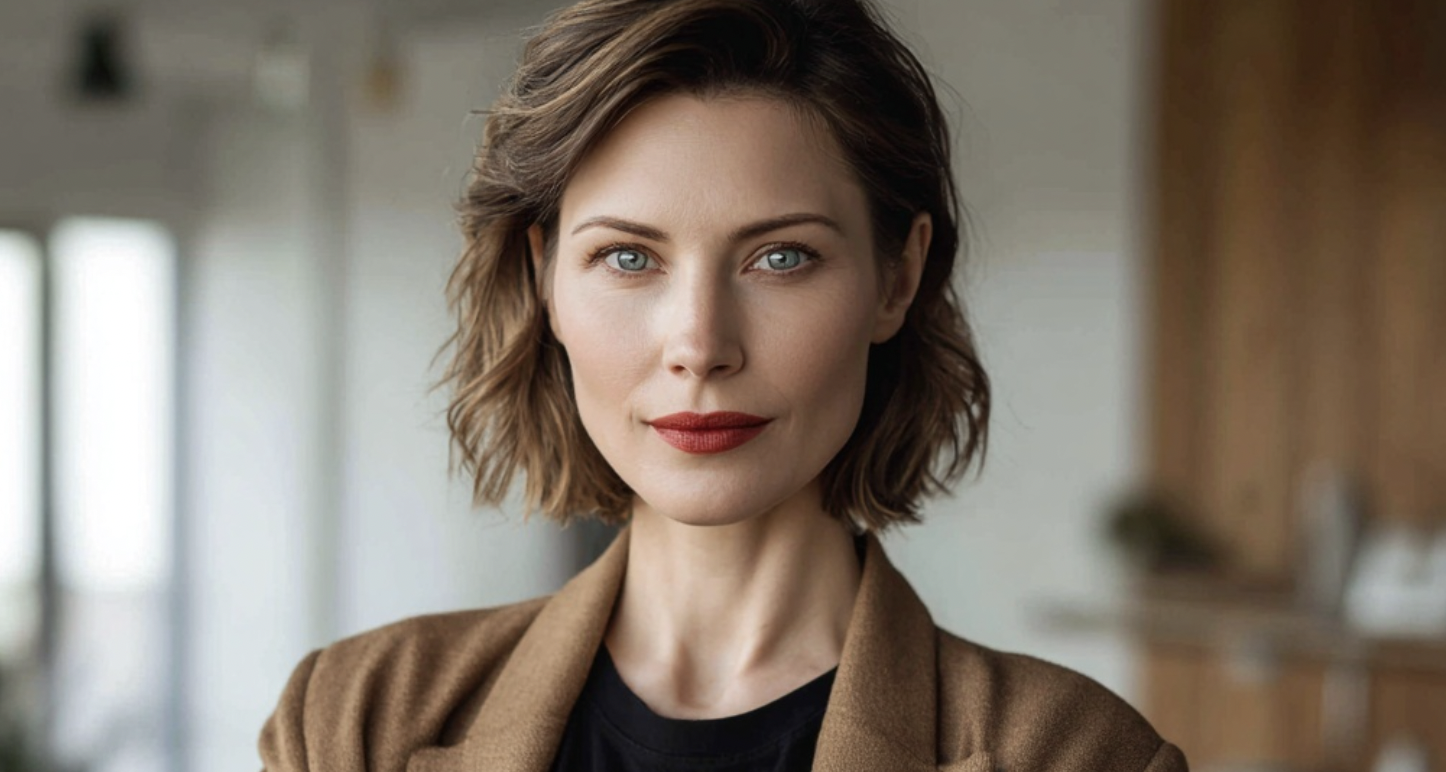When Vera Nikolaevna received a message that her third cousin Tatyana, who lived somewhere deep in the Urals, was asking to stay with her in Moscow with the kids for a couple of weeks, her first reaction was to refuse. What could they possibly have in common? The last time they’d seen each other was some twenty years ago at their grandmother’s funeral, and even then they’d barely exchanged a few words.
“Tanya is coming from the Urals, can you imagine? — Vera’s mother wrote to her. — Her younger daughter got a voucher to a music camp for some competition, and the older one is going to submit her documents to Moscow State University. Will you let them spend the night?”
“‘Spend the night!’ — Vera snorted. — I know those overnights. They’ll come for a week and stay for a month.”
Vera Nikolaevna, the head of marketing at a large company, was used to a certain level of comfort. Her apartment in central Moscow was furnished with meticulously curated minimalism; everything had its place. The thought that strangers—children, no less—would appear in that space filled her with inner resistance.
But she couldn’t refuse her relatives. Her upbringing wouldn’t allow it.
“Of course, let them come,” she told her mother on the phone, mentally rearranging her vacation plans. “Where would it be more comfortable for them to sleep— in the living room or in my bedroom?”
“You’ll figure it out,” her mother replied happily. “Tanya isn’t picky. She and her husband built their house with their own hands. He’s a gamekeeper, always off in the forest. And she runs some little library part-time.”
“Of course, — Vera thought. — A gamekeeper and a librarian from the back of beyond. I’ll probably have to spoon-feed them and drag them around the museums.”
On the day her guests were due, Vera was nervous. She tidied the apartment, ordered groceries for delivery, made up the sofa in the living room for Tatyana and the younger daughter, and set up a spot in the bedroom for the older one. She herself planned to sleep on a small folding couch in her study.
The doorbell rang precisely at the agreed time.
“Hello, Verochka,” said a woman of about forty-five on the doorstep, wearing a simple linen dress. Her hair was gathered in a neat bun, and her eyes shone with genuine warmth. “Thank you for agreeing to take us in.”
Behind her, two girls shifted from foot to foot—one about sixteen, tall and serious; the other younger, around ten, with curious eyes.
“Come in,” Vera stepped aside, scrutinizing her relative. Tatyana looked… ordinary. None of the rustic clumsiness or provincial tastelessness she had, for some reason, expected.
“This is Masha,” Tatyana placed a hand on the older girl’s shoulder. “And this is Liza. Girls, say hello to Aunt Vera.”
“Good afternoon,” Masha nodded gravely.
“Hello, Aunt Vera!” Liza sang out. “It’s so beautiful here! Like in a magazine!”
“Thank you,” Vera couldn’t help but smile. “Come in, make yourselves at home. The journey must have been tiring?”
“Two days on the road,” Tatyana shrugged. “But we’re used to it. It’s several hours by bus from our settlement to Yekaterinburg, and then the train.”
While the guests unpacked, Vera watched them on the sly. No fuss, everything precise and organized. Tatyana took neatly folded items out of the bag; the girls helped silently. She wondered what they were planning to do in Moscow for two weeks.
“I’ve freed up my bedroom for you,” Vera said. “Masha can sleep there, and you and Liza can take the living room. I’ll set myself up in the study.”
“Oh, Vera, why make it so complicated?” Tatyana asked in genuine surprise. “We’ll fit perfectly well on folding cots. You’ve already helped us by letting us stay.”
Vera shook her head. “No, if you’re guests, you should be comfortable. I insist.”
Tatyana didn’t argue, just nodded gratefully.
“You must be hungry after the trip?” Vera asked. “I ordered dinner; it’ll be here soon.”
“Thank you, but we had a bite on the train,” Tatyana replied. “And if you don’t mind, I’d like to cook something myself tomorrow. I brought a few things—dried mushrooms, berries, some herbs. I’d love to treat you.”
“Well, here we go,” Vera thought with mild irritation. “She’ll start taking over my kitchen now.”
“No need to trouble yourself,” she said aloud. “I’m sure you’ve got a packed schedule. When does Liza go to camp?”
“In three days,” Tatyana answered. “And Masha has her interview at the university in a week. So we have some time to get to know Moscow. If you don’t mind, of course.”
“What would you like to see?” Vera asked, mentally preparing to put together a cultural program for provincial guests.
“Masha wants to go to the Biological Museum and the biology faculty at MSU,” Tatyana said. “And Liza dreams of visiting the Tretyakov Gallery.”
Vera raised her eyebrows in surprise. She’d thought she’d have to take them to the zoo and Red Square.
“And you, Tanya? What are you interested in?”
“Me?” Tatyana pondered. “You know, I’d like to go to the Pushkin Museum. My first degree is in art history, though I never worked in the field.”
Vera nearly choked.
“Art history? I thought you were a librarian.”
“That too,” Tatyana laughed. “In our settlement you don’t get to choose; you work where there’s work. I also tutor— I run a world art culture club at the school.”
The next few days went nothing like Vera expected. In the mornings Tatyana got up before everyone and made breakfast—not just eggs or sandwiches, but true culinary little masterpieces. One day it was fluffy pancakes with lingonberry jam, another a baked casserole with forest berries, then cottage-cheese fritters whose aroma made Vera’s mouth water.
“Tanya, where did you learn to cook like this?” Vera couldn’t stand it by the third day, happily polishing off syrniki with sour cream.
“What’s there to learn?” Tatyana shrugged. “When your husband goes off into the forest for a week, and the nearest store is ten kilometers away, you’re bound to learn how to make something tasty from simple ingredients. We keep our own chickens and a garden. You eat what you grow.”
After breakfast they usually split up. Vera went to work, Masha prepared for admissions, and Tatyana and Liza headed out to explore the city. They never asked Vera to accompany them or plan routes—Tatyana navigated by map just fine and knew what she wanted to show her daughter.
In the evenings over dinner, which Tatyana now always cooked (despite Vera’s protests), they discussed the day’s impressions. And Vera discovered, to her surprise, that she found their conversations increasingly interesting.
“…and can you imagine, Vera, at the Tretyakov, Liza gave us a whole tour of the Vrubel hall!” Tatyana said in admiration. “Even the guide came over to listen.”
“I just read a lot about him,” Liza muttered shyly. “Our teacher recommended books.”
“And which faculty are you applying to, Masha?” Vera asked the older girl.
“To the biology faculty at MSU,” Masha replied. “I want to study medicinal plants. In the Urals we have such rich flora, and there’s still so little research.”
“And what are your chances?”
“Not bad,” Masha shrugged. “I have a gold medal and wins in academic competitions. But the competition is tough, of course.”
Vera caught herself genuinely worrying about this serious girl. She suddenly wanted Masha to get in and stay in Moscow. Maybe even live with her for a while, until she got settled…
The thought surprised Vera. She, who had always valued her personal space, was suddenly ready to offer a near-stranger a place in her home? What was happening to her?
“Vera, are you feeling ill?” Tatyana asked on the fifth day of their stay when Vera came home pale and with dark circles under her eyes.
“No, just a hard day,” Vera sank wearily into a chair. “Our biggest client backed out of a contract, and now everyone’s in a panic. I spent the whole day trying to save the situation—calling, writing, persuading…”
“Can I help somehow?” Tatyana asked, laying a sympathetic hand on her shoulder.
“What could you possibly do?” slipped out of Vera, and she immediately regretted it. “Sorry, I didn’t mean to be rude. It’s just been a tough day.”
“I understand,” Tatyana nodded, unoffended. “Let me brew you some tea? I have a good blend—it calms you and brings your strength back.”
Vera wanted to refuse, then waved a hand. “Fine. It can’t get any worse.”
Tatyana went to the kitchen and returned a few minutes later with a cup of fragrant tea.
“Drink it slowly. And tell me what happened. Sometimes it helps to talk it out.”
And Vera, not knowing why, began to talk. About the contract, the pressure from management, the prospect of losing her job, the mortgage on the apartment she still had years to pay…
“…and the worst part is, I don’t know what to do next!” she finished, nearly in tears. “If we lose this client, my whole career is over.”
Tatyana listened carefully without interrupting, then asked, “Why did the client refuse?”
“He says our proposal is too standard and doesn’t account for the specifics of their business.”
“And is he right?”
Vera thought for a moment.
“Possibly. We really do use typical solutions. But we just don’t have the resources to create a fully bespoke project!”
“What if you approached it differently?” Tatyana suggested. “We had a similar situation at our library. We were given a very small budget to update the collection, but we needed to attract new readers. And do you know what we did?”
“What?” Vera looked at her with interest.
“We created a project called ‘A Book from Your Neighbor.’ Anyone in the settlement could bring a book that impressed them and write a short review. We designed those reviews nicely and attached them to the books. It became a kind of personal recommendation from someone you know. And you know, it worked! People started coming to read the books their neighbors recommended.”
“And how does that help me with the contract?” Vera asked, puzzled.
“I mean that sometimes you don’t need a big budget or standard solutions. You just need to find something simple yet personal that hooks the client. Something that shows you really thought about them—specifically them—and not just offered a standard set of services.”
Vera reflected. There was sense in Tatyana’s words. Maybe it was worth rethinking her approach?
“You know,” she said, sipping the tea, “you’re right. This client has its own business philosophy—they’re always talking about ‘returning to roots.’ Maybe we should play to that…”
They discussed a new presentation concept late into the night, and by morning Vera had an entirely fresh approach, which she presented to the client the next day. To her surprise, the idea worked—the contract was saved.
When it was time to take Liza to the music camp, Vera volunteered to go with them.
“Vera, you have work,” Tatyana said, surprised.
“I took the day off,” Vera waved it off. “I want to see this camp. And help you, if needed.”
On the way, Liza talked about her music school, the competition where she won the grand prix, and the teacher who gave her extra lessons without charging.
“…and you know, Aunt Vera, when I grow up I want to go back to our settlement and teach children music. Many are talented—there just aren’t many opportunities.”
Vera looked at this serious girl with a violin case and thought how wrong her notions of “backwoods folks from the Urals” had been.
The camp turned out to be a prestigious place for gifted children, and Vera noticed how some parents, who had brought their kids in expensive cars, glanced with mild disdain at modestly dressed Tatyana.
“Pay them no mind,” Vera whispered, noticing Tatyana tug at her simple dress. “Believe me, your Liza will give many of these polished Moscow kids a run for their money.”
“I’m not worried about myself,” Tatyana replied. “I just don’t want Liza to be shunned because she’s not from Moscow and not from a wealthy family.”
“If she plays as well as you say, she’ll be respected regardless.”
And indeed, when the children gave a short concert before the parents left, Liza performed a Tchaikovsky piece so beautifully that the hall fell silent—and then erupted in applause.
“She’s brilliant,” Vera whispered to Tatyana, surreptitiously wiping away a tear. “You’ve raised amazing children.”
“Thank you,” Tatyana replied simply. “My husband and I try to give them everything we can.”
When it came time for Masha to go to her interview at MSU, Vera unexpectedly took another day off.
“I’ll go with you,” she told her niece. “For moral support.”
“That’s not necessary, Aunt Vera,” Masha objected. “I can handle it.”
“I know you can,” Vera smiled. “But I want to. Besides, I graduated from MSU myself—I can show you some secret spots only students know.”
After the interview—which, according to Masha, went well—they strolled around the university campus. Vera showed her the faculty buildings, told stories from her student days, and to her own surprise felt echoes of that long-forgotten joy of discovery and learning that had once filled her.
“You know,” she said thoughtfully, “I once dreamed of doing research, too. But then business pulled me in—career, money…”
“Why not go back?” Masha asked. “Mom says it’s never too late to start doing what you truly love.”
Vera looked at her niece in surprise.
“Your mother is a very wise woman.”
“I know,” Masha replied simply.
On the last evening before Tatyana and the girls were to head back (the admission results were to arrive later by email), Vera arranged a farewell dinner. She herself made several dishes using recipes she’d learned from Tatyana over those two weeks.
“Tanya,” she said when the two of them were alone after dinner, “I want you to know: if Masha gets in, she can live with me. And she can come for holidays, and really… anytime.”
Tatyana looked at her attentively.
“Thank you, Vera. That’s a very generous offer. But I want you to understand it’s not a temporary thing. Students study for several years.”
“I know,” Vera nodded. “And I’m not just being polite. I liked… not being alone.”
Tatyana smiled.
“You know, when I was getting ready to come to you, I was nervous too. I thought: what on earth will I talk about with this successful Moscow business lady? But it turned out we’re just two women who have a lot in common.”
“And even more differences,” Vera laughed. “Which is, perhaps, even more interesting.”
They talked late into the night. Tatyana spoke about life in the settlement, her husband, how they built their house with their own hands, the library she had turned into the cultural center of the settlement, the school plays she produced, and the garden that fed them year-round.
Vera, in turn, talked about her work, how she strove for success, sought recognition, bought this apartment by scrimping on everything, about her travels in Europe, the exhibitions and concerts.
And the more they talked, the clearer it became to Vera that what she had considered the advantages of her “capital” life—career, money, status—had not made her any happier than Tatyana with her simple life in a Ural settlement.
Three months passed. Masha was admitted to MSU and now lived with Vera, helping around the house. Vera began attending evening courses in art history—an old passion she had once sacrificed to career ambitions. And she started planning her vacation—not to Europe, as usual, but to the Urals, to visit Tatyana.



